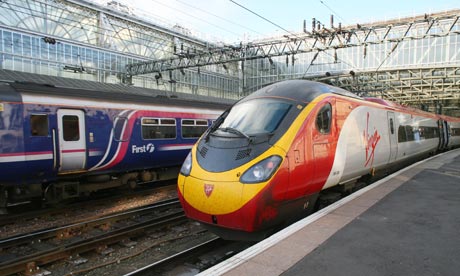Virgin Rail will run the west coast mainline for a further 23 months, the government has announced, reports The Guardian.
Richard Branson’s firm has been given the right to run trains from London to Glasgow until 9 November 2014 without the competition for a short-term interim franchise that the transport secretary, Patrick McLoughlin, promised when FirstGroup’s award was scrapped in October.
Instead of the three-stage process, Virgin will continue to run the service until another long-term franchise can be awarded. The deal, coming only three days before Virgin’s 15-year franchise was due to expire, is believed to have been held up by legal concerns over EU procurement rules and the potential for further lawsuits from rival bidders.
McLoughlin said: “We are determined to ensure not only that passengers continue to experience the same levels of service they have in the past, but that services improve.
“There will be a new hourly service linking Glasgow and London and we will also work with Virgin Trains to explore other service improvements.”
He went on: “I am also extremely pleased that passengers will benefit from up to 28,000 more seats daily thanks to the delivery of 106 new Pendolino carriages on to the west coast line which has happened on budget and ahead of schedule.”
The government also announced on Thursday that the Department for Transport would be able to shorten the 23-month period “by up to six months if a subsequent franchise can be let on a shorter timescale”.
Virgin had high hopes of extending its long tenure on west coast when bids were invited for a new 13-year franchise which was due to start on 9 December this year.
But in August the DfT announced the new franchise had gone not to Virgin but to rival transport company FirstGroup.
It was only after Branson, who had branded the bidding process “insane”, mounted a legal challenge to the decision that McLoughlin scrapped the bidding process, saying there had been mistakes by the DfT.
Three DfT officials were suspended and negotiations were started with a view to getting Virgin to run the line for between nine and 13 months before a short interim franchise was offered followed by a longer one later.
Thursday’s news means the government has altered its plans for the immediate future of the line, in that the Virgin temporary deal is for far longer and there will be no interim franchise before the long-term one is introduced.
When he pulled the plug on the west coast franchise bidding, McLoughlin appointed businessman Sam Laidlaw to produce an independent report into the fiasco.
After producing damning initial findings, which listed failings by the DfT, Laidlaw presented his full report to the department last week.
But with one of the suspended department officials, Kate Mingay, mounting a legal challenge to her suspension, McLoughlin announced that he was delaying the Laidlaw report publication until this week, with publication likely later on Thursday.
Laidlaw had been due to appear before the House of Commons Transport Committee this week, but MPs will now hear his evidence on 18 December.
The committee’s chairman, Louise Ellman, criticised the DfT over the delay and the RMT transport union has been upset that the department did not take the opportunity to take the West Coast line into public ownership.
On Wednesday, Martin Griffiths, the chief financial officer of Stagecoach, which owns 49% of Virgin Rail said: “We are the operator of the service – the cancellation [of the franchise] was nothing to do with us.”
In a broad hint that the government was about to backtrack on its interim franchise solution, he said: “We would not be keen on that – no one in the industry is keen on bidding for a short-term franchise. I’m optimistic that we’ll see something that everyone can be comfortable with.”
FirstGroup has not publicly ruled out legal action after the debacle that saw the government retract its award of the lucrative west coast franchise up to 2026. The U-turn came after a legal challenge by Virgin that ultimately led to the discovery of serious failings in the DfT’s bidding process.
However FirstGroup’s chief executive, Tim O’Toole, has spoken of the need to restore the wider franchising process as soon as possible and keep the rail network in private hands, a goal shared by McLoughlin. FirstGroup is likely to receive a similar franchise extension for the Great Western trains it currently operates. O’Toole also leads the industry body, the Rail Delivery Group, which has privately lobbied for shorter, tailored franchises as the government reviews its rail policy.
McLoughlin is also set to publish a redacted version of Sam Laidlaw’s final report into what caused the franchise fiasco which has landed the taxpayer with a bill that could run to hundreds of millions of pounds. His interim findings suggested that an under-resourced department for transport breached its own guidelines and treated FirstGroup and Virgin differently, raising “significant issues about the ability of the DfT effectively to conduct rail franchise competitions”. At least one of the three civil servants suspended is suing the department, and Labour has accused the government of scapegoating officials for a crisis that had “cabinet ministers’ fingerprints all over it”.


